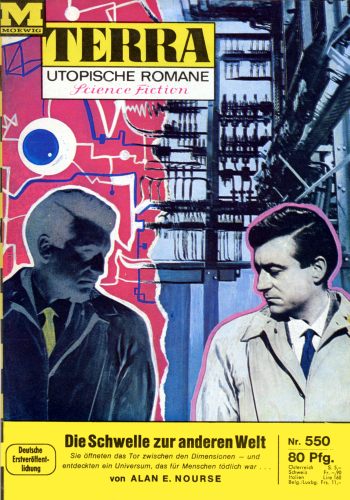Terra SF 550, 01.12.1967
Deutsche Erstausgabe
Originalausgabe ANALOG 1951
Fix-up McKay 1965
Titelbild : Karl Stephan
To save Earth, Bob Benedict must venture once more into the invisible, dangerous world of The Thresholders. If he fails to return — sane — Earth, and all those who inhabit the planet, will be hurled into oblivion.Klappentext des Kindle-eBooks
An exploratory push past the point of absolute zero opens a door to a bizarre, parallel universe. Seventeen-year-old Gail Talbot is the last to enter it and the only one to return intact. She turns thumbs down on the frantic men of science and keeps the secret of what she saw there, realizing that no adult mind, even her own, could cope with it. But eventually she passes her knowledge on to her son, who some twenty years later must act as liaison between the two worlds when science once mere tears the fabric between them. The result of this new breakthrough is catastrophic until Robert manages to communicate with the "Threshholders" and an agreement is reached. The ""Universe Between"" becomes a channel for matter transference and man gains the stars as well as new resources for a depleted earth. But there are some startling problems and some even more astonishing discoveries in store. Highly imaginative; posits some challenging concepts to the young scientist.Kirkus Review, 08.10.1965
Daran, daß die Kirkus Review zu einem erheblichen Teil aus der Inhaltsangabe besteht, merkt man schon, daß der Roman nicht ganz so prickelnd ist. Er ist eben aus den frühen 50ern, Dutzendware, oberflächliche Charaktere und eine wilde wissenschaftliche Story. Aber man langweilt sich nicht, Alan E. Nourse ist ein großartiger Geschichtenerzähler. Und obwohl er keiner der ganz Großen ist, habe ich bisher noch jeden Roman von ihm gerne gelesen.
Ich möchte an dieser Stelle einmal etwas anderes ansprechen, nämlich einen der Gründe, warum ich so gar keine Probleme mit den Perry-Rhodan-Silberbänden habe. Dies sind überarbeitete und modernisierte Buchversionen der Heftromane, von den Autoren (Willi Voltz, Horst Hoffmann, Hubert Haensel) selbst bearbeitet. Hardcore-Heftroman-Fans sprechen hier von "Geschichtsklitterung" und "Zensur". Ich habe das nie so gesehen - weil mir immer bewusst war, daß derartige Fix-Ups klassischer Standard waren, den auch und gerade die großen Autoren immer wieder gerne gemacht haben. Hier ist es Alan E. Nourse, ein anderes Beispiel ist A. E. van Vogt, der die Technik innerhalb der SF sozusagen entwickelt hat :
In Reflections of A.E. van Vogt: The Autobiography of a Science Fiction Giant, with a Complete Bibliography (1975), van Vogt uses the term "fix-up" (or Fixup) in the sense which we have adopted for this encyclopedia: a book made up of previously published stories altered to fit together – usually with the addition of new cementing material – the end product being marketed as a novel. It is possible that van Vogt invented the term for, although fixups are not unknown outside sf, the peculiar marketing circumstances of the genre in the USA encouraged their creation, and certainly van Vogt wrote (or compiled) more fixups than any other sf writer of stature. It was during his time of relative inactivity as a creator of original material – the 1950s and early 1960s – that he began producing these numerous fixups, including titles already mentioned (see above). Further fixups incorporating Golden-Age material include >The War Against the Rull< (stories April 1940-February 1950 Astounding; fixup 1959), >The Beast< (stories July 1943-April 1944 Astounding; fixup 1963; vt Moonbeast 1969) and >Quest for the Future< (stories January 1943-July 1946 Astounding; fixup 1970).SFE
Auch "The Universe Between" ist ein Fix-up, das Original wurde in zwei Teilen 1951 in ANALOG veröffentlicht. Man merkt es dem Roman an, daß er zusammengeschustert wurde, es ist ein definitiver Bruch enthalten. Aber der Autor (!) hat das Teil so zusammengeschrieben, die obige Kirkus-Kritik bezieht sich auch auf das FixUp-Buch. Von daher denke ich immer, was van Vogt und Alan E. Nourse Recht war, sollte auch für "Perry Rhodan" gelten. Und deshalb hatte und habe ich überhaupt keine Probleme mit deutschen oder angloamerikanischen FixUps.
Einen ausführlichen Artikel über Alan E. Nourse von Don D'Ammassa mit vielen Kommentaren zu seinen Büchern findet man hier

Keine Kommentare:
Kommentar veröffentlichen